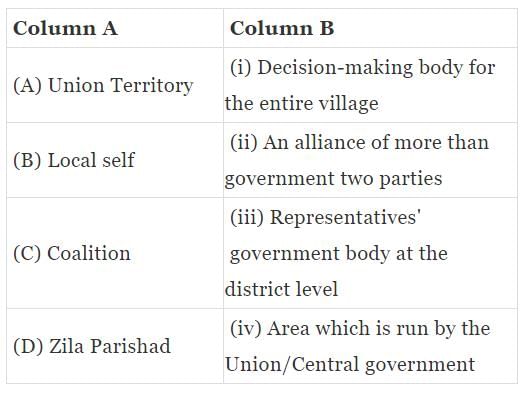UPSC Exam > UPSC Tests > Test: Federalism - 1 - UPSC MCQ
Test: Federalism - 1 - UPSC MCQ
Test Description
10 Questions MCQ Test - Test: Federalism - 1
Test: Federalism - 1 for UPSC 2025 is part of UPSC preparation. The Test: Federalism - 1 questions and answers have been prepared
according to the UPSC exam syllabus.The Test: Federalism - 1 MCQs are made for UPSC 2025 Exam.
Find important definitions, questions, notes, meanings, examples, exercises, MCQs and online tests for Test: Federalism - 1 below.
Solutions of Test: Federalism - 1 questions in English are available as part of our course for UPSC & Test: Federalism - 1 solutions in
Hindi for UPSC course.
Download more important topics, notes, lectures and mock test series for UPSC Exam by signing up for free. Attempt Test: Federalism - 1 | 10 questions in 10 minutes | Mock test for UPSC preparation | Free important questions MCQ to study for UPSC Exam | Download free PDF with solutions
Detailed Solution for Test: Federalism - 1 - Question 1
Test: Federalism - 1 - Question 2
Assertion: India is a federal country.
Reason: In India power is divided between a central authority and various constituent units.
Reason: In India power is divided between a central authority and various constituent units.
Detailed Solution for Test: Federalism - 1 - Question 2
Detailed Solution for Test: Federalism - 1 - Question 3
Test: Federalism - 1 - Question 4
In federalism, power is divided between various constituent units and______.
Detailed Solution for Test: Federalism - 1 - Question 4
Test: Federalism - 1 - Question 5
Assertion: India is a ‘holding together’ federation.
Reason: All the states have equal powers and are as strong as union government.
Detailed Solution for Test: Federalism - 1 - Question 5
Test: Federalism - 1 - Question 6
In case of a clash between the laws made by the centre and a state on a subject in the concurrent list:
Detailed Solution for Test: Federalism - 1 - Question 6
Test: Federalism - 1 - Question 7
In the federal system, the central government cannot order the
Detailed Solution for Test: Federalism - 1 - Question 7
Test: Federalism - 1 - Question 8
Assertion: Banking in India is included in the union list.
Reason: Only the union government makes laws related to banking.
Detailed Solution for Test: Federalism - 1 - Question 8
Detailed Solution for Test: Federalism - 1 - Question 9
Test: Federalism - 1 - Question 10
Which of the following country is an example of "coming together federation"?
Detailed Solution for Test: Federalism - 1 - Question 10
Information about Test: Federalism - 1 Page
In this test you can find the Exam questions for Test: Federalism - 1 solved & explained in the simplest way possible.
Besides giving Questions and answers for Test: Federalism - 1, EduRev gives you an ample number of Online tests for practice
Download as PDF















